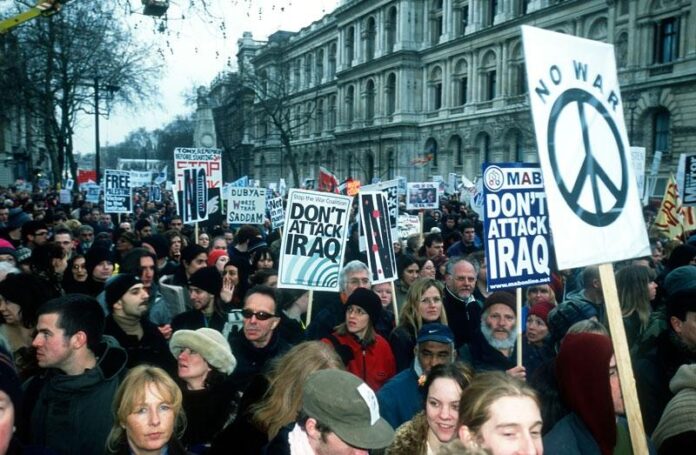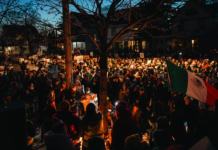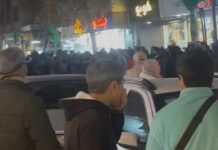The world changed twenty years ago. It’s rare that a single event like the 9/11 terrorist attack in the USA can have that much impact. But of course it wasn’t just an act of terror which altered the course of history. Rather it was the response to it
Jason Toynbee, Socialist Alternative (ISA in England, Scotland and Wales)
The world changed twenty years ago. It’s rare that a single event like the 9/11 terrorist attack in the USA can have that much impact. But of course it wasn’t just an act of terror which altered the course of history. Rather it was the response to it. 9/11 initiated a new wave of bloody imperialism led by the capitalist states of the US and Britain, with savage wars in Afghanistan and Iraq, and state-sponsored Islamophobia. The cycle of hatred and death continues today.
This is not to diminish the horror of the event itself. Almost 3,000 were killed in 9/11 and its aftermath in the US. Socialists should be clear on this: we condemn the attack unequivocally and indeed all acts of terrorism, not just for their brutality but because they inevitably lead to a reactionary response, home and away. As we will see, though, after 9/11 ruling class reaction was met with the mass mobilisation of ordinary people, resistance that had the potential to stop the wars and reshape history.
World relations then and now
To begin, it’s worth going back to the year of the atrocity, 2001, when capitalism was bullishly confident. It had been more than ten years since the collapse of the USSR and the Stalinist states in Eastern Europe. The ‘communist’ countries, despite their authoritarian and distorted character, nevertheless kept alive the memory of the Russian Revolution and the possibility of an alternative to capitalism. Their downfall was a source of comfort for capitalism.
Indeed at the start of the 1990s commentators confidently announced that we had reached ‘the end of history’ (the title of a book by Francis Fukyama). In other words capitalism in the shape of benign ‘liberal democracy’ would rule unchallenged across the world — and for all time! This was nonsense of course. The 90s saw a massive increase in global inequality as neoliberalism bit hard. In all the advanced capitalist countries as well as poorer ones privatisation, deregulation, and cuts in public spending impoverished ordinary people while boosting the wealth of the rich.
In terms of trade and capital flows the US and other capitalist powers drove the project of ‘globalisation’. A key milestone was the founding of the World Trade Organisation in 1994 to speed the ‘opening up’ of new markets for goods and services. In practice this meant that nascent industries in poorer economies were driven to the wall, while transnational corporations made a killing with cheap exports, or else built their own factories in the developing world to exploit cheap labour.
If all this sounds like a success story for the capitalists we just need to return to 2021. Today the promise of never ending capitalist expansion has been brutally crushed by the hard facts of the 21st century: disastrous wars, a cold war between the US and China, long depression, a fall in real wages and austerity. In response there have been upsurges in struggle by the working class around the world. As governments intervene to prop up the system in the Covid emergency, neoliberalism itself — the global regime of free markets and unrestrained capitalism — looks badly damaged, unsustainable even. And to add to the woes of the US and its imperialist allies the Taliban are victorious in Afghanistan
Of course the crisis that capitalism faces on so many fronts today cannot be attributed solely to 9/11. Undoubtedly, though, that event and most importantly the retaliation against it have played a key part.
9/11 and the ‘War on Terror’
The immediate response of the US government after the attacks was bloody vengeance. Carpet bombing of Afghanistan, where Al-Qaeda had made its base and one of the poorest countries in the world, began on 7 October. Straight away Prime Minister Tony Blair offered British military support to President Bush. By the end of the year US and British forces had ousted the Taliban government — inevitable given the overwhelming and brutal force applied.
In fact this was only the start of a murderous war of occupation in which around 241,000 people have been killed, the great majority being Afghans and Pakistanis, with 71,000 civilians among them.* Ordinary people have also suffered incalculably from poverty, hunger, disease and poor sanitation — all directly due to the war. It has been a disaster for the country.
Still, mighty though it was, imperialist revenge in Afghanistan was never going to be enough in the ‘War on Terror’. In addition to whipping up racism and nationalism with the aim of dividing the working class at home, there was also the lure of using a ‘righteous’ war for straightforward imperialist ends — control of the strategically important Middle East with its major deposits of oil next door to Afghanistan.
Socialists expected this, but it became abundantly clear in 2002 when President Bush began advocating war in Iraq on the grounds that Iraq’s ruler, Saddam Hussein, not only represented a terrorist threat but was developing ‘weapons of mass destruction’. This lie was propagated by Prime Minister Blair too. What followed was invasion in 2003, and a yet more bloody occupation than that of Afghanistan.
The long term consequences of the Iraq War, overlaid on the Afghan conflict, have been huge. The power of reactionary clerics in Iran, and Sunni-Shia sectarianism across the Muslim world have been bolstered with continuing civil war in Iraq itself, and a new civil war in Yemen. The civil war in Syria, the rise of the Islamic State and IS sponsored terror attacks, including in Britain — all of these were generated to a greater or lesser extent by the imperialist venture begun by Bush and Blair.
It’s clear, then, that far from increasing security or making the world more peaceful, the War on Terror made worse the underlying social and political causes of terrorism, and massively increased resentment around the world against the US and the other imperialist powers.
Resistance
All this could have been prevented — the popular will to stop the war was certainly there. 2002 saw the beginnings of an international movement of socialists, youth and trade unionists. And as the lies about the need to attack Iraq spewed out of the mouths of Bush and Blair, ordinary people in their millions were spurred into action. Between January and April 2003, 36 million people across the planet took part in nearly 3,000 anti‑war protests.
The biggest of these was an international day of action on February 15 of that year. In London up to two million marched against the war — the biggest demonstration in British history. The event was astonishing, not just for its size and the involvement of many who had clearly not been on a march before, but also for its militancy. Charles Kennedy, the Liberal Democrat leader, spoke against the war, but said he would support it if the UN passed a second resolution backing intervention. He was loudly booed.
Meanwhile speakers on the left like Tariq Ali, who insisted that system change would be needed to end capitalist wars, were wildly cheered. And calling for strikes whenever the attack on Iraq would finally begin (a call initiated internationally by the Committee for a Workers’ International, now International Socialist Alternative) left trade union leaders Bob Crow (RMT) and Billy Hayes (CWU) received strong support too.
Disgracefully, however, this call was not echoed more widely among leaders of the trade union movement. They either actively supported the new war or kept quiet. Meanwhile the union lefts failed to get organised. As for the Stop the War Coalition which called the protest, it missed a golden opportunity to forge a movement out of the groundswell of resistance.
At the time Socialist Alternative members called for a general strike to be organised from the bottom up if the leaders would not give a lead, and for Labour MPs such as Jeremy Corbyn and John McDonnell, who voted and marched against the invasion, to set up a new party of the working class which would struggle against war and the neo-liberal policies of New Labour. Making such an appeal to a millions-strong movement would have received a huge positive response with the possibility of a new party being formed almost overnight. But despite some heroic efforts to keep the mobilisation going in the days after Iraq was attacked on March 20, including strikes by school students across the country, the embryonic movement ultimately failed to stop the war.
However, for many, particularly young people, the anti-war movement represented a turning of the tide. It politicised many who went on to get organised in other campaigns and groups, who still now have a deep hatred for Blair and Blairite ideas. Even though the movement wasn’t successful, the capitalist class still fear mass movements against wars which has been an important factor in their hesitancy to send troops into Syria and Libya.
The lesson is clear. Ordinary people in their masses will flock to resist imperialist wars. But what’s then needed is leadership with a bold programme to organise and carry forward the movement so that instead of subsiding it advances step by step. Most importantly, we need trade union and workplace action to harness the power of the working class in its millions, and employ the hugely powerful weapon of the strike against the warmongering of capitalist states. Today Socialist Alternative organises precisely to build such a leadership and put forward such a programme.
Marxism and Terrorism
These methods are diametrically opposed to terrorism. In the 19th and much of the 20th centuries elements of the left adopted terror in the form of assassinations, hijackings and bombings. But as Leon Trotsky pointed out such acts are always a distraction from the real work of socialists: to build a mass working class movement which brings people together so they see the power of their own collective action. That’s what changes society. Conversely, tactics of individual terror planned in secret undermine collective work.
Of course Al-Qaeda was never a left group, but a reactionary gang whose agenda was to take the world backwards into religious bigotry and hatred. In that respect it might appear that the spectacular violence of 9/11 succeeded simply by provoking the War on Terror. In the short term there was certainly a reaction in the Arab world which helped Al-Qaeda’s cause to some extent, boosting recruitment and fundraising. Islamophobia sponsored by the capitalist states at home had a similar, if very limited, effect in Islamic communities in Europe and the US too.
However the extraordinary popular revolutions of the Arab Spring in the early 2010s showed that in fact 9/11 hadn’t succeeded in the way its perpetrators had hoped. The uprisings in Tunisia, Libya, Egypt, Yemen, Syria, and Bahrain were a secular revolt by the masses for the masses, with demands for system change, an end to autocracy and the rule of bourgeois elites. Trade unionists and left parties fought for revolutionary change; solidarity and collective action were the order of the day. This was the very opposite of the Al-Qaeda fantasy of an Islamic theocratic Caliphate.
Socialist alternative needed
Twenty years on 9/11 has become a gloomy emblem of capitalism in decline. Instead of righteous bellowing for vengeance from the ruling class there’s now doubt and indecision. In Afghanistan the US military is getting out as quietly as possible to leave the country in the hands of Taliban insurgents. Its future — a highly uncertain prospect — will involve the US looking on rather than having dominant influence. Anyway imperialism from whatever quarter will not be able to solve Afghanistan’s problems. The twenty years that have followed 9/11 have been an object lesson in how the intervention of great powers always fails.
As the world enters a new period of instability and crisis one thing remains certain. Only the great masses of ordinary people the world over, led by the working class and youth, can overthrow the hateful capitalist system. There are signs everywhere that this is being recognised more and more. You can speed the process up — join the socialists, join International Socialist Alternative!




